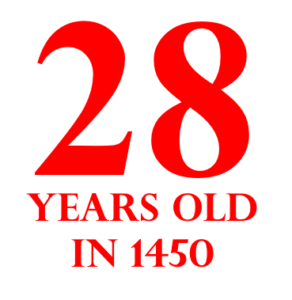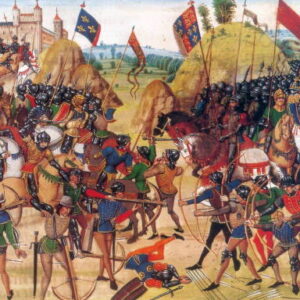King Henry VI
 Childhood
Childhood
Henry was born on 6th December 1421, son of Henry V of England and Catherine of Valois. Henry V was the heir of the kingdom of France and England, once the king of France, Charles VI, died. However, it was Henry who died first, at the young age of 35, which lead to the French contesting the kingship.
Accession
Henry, being 9 months old at the time, was unable to rule so Henry’s brother, Humphrey, Duke of Gloucester ruled as Lord Protector. At the age of 16, he managed to shake off the control of his uncle and assumed full royal powers.
Henry’s father had been dynamic warrior king, whereas Henry grew up to be timid, pious and adverse to conflict. The English dominance in France waned after 1429, and when the alliance with Burgundy was dissolved, in 1435, this left the English possessions in France more vulnerable.
Henry’s royal court ballooned in size to such an extent, moves were made to limit it to a maximum of 420 people, without much success. One of these new people in the court, was the nouveau riche Duke of Suffolk, who he entrusted implicitly.
Internal Conflict
Henry’s advisors formed into two diametrically opposed solutions to France. Supporters of Richard of York and the Duke of Gloucester, to wage war with the French, and supporters of Duke of Suffolk and Cardinal Beaufort had a conciliatory approach to France. The conciliatory faction won the day and Suffolk was dispatched to France to arrange a marriage, which also came with a peace treaty.
Marriage
There is one report that when Margaret came to England, Henry was so anxious to meet his bride, he disguised himself as a squire, but I don’t believe this story. Whatever the truth, he liked her and seemed generally in love with her. They spent more time together than was normal for a King and Queen of England.
 War in France
War in France
After securing the marriage of Margaret of Anjou it was hoped an everlasting peace between England and France, and initially things looked good. But when Maine was ceded, either as part of the marriage deal or a later deal, he and Suffolk came under criticism. The resurgent French later made further land gains and taxes were raised to pay for an army to repel them. These taxes and the effect of the “great slump” and loss of trade, caused further unrest at home.
His inability of securing the succession was of interest to the realm and it was becoming obvious that Henry was not certain as to what to do. Recent discoveries in the National Archives suggests that trusted attendants were allowed in royal bedroom, in a coaching capacity. Richard of York became the next in line to the throne when the Duke of Gloucester died, making the need for a son more greater.
Henry often showed compassion to his friends and enemy’s and lacked the ruthlessness and decisiveness needed to rule. When Suffolk was accused of mismanagement amongst other things, Henry saved his favourite from the executioner, by banishing him for 5 years.
